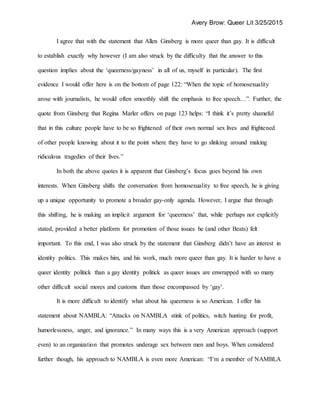Allen Ginsberg
- 1. Avery Brow: Queer Lit 3/25/2015 I agree that with the statement that Allen Ginsberg is more queer than gay. It is difficult to establish exactly why however (I am also struck by the difficulty that the answer to this question implies about the ‘queerness/gayness’ in all of us, myself in particular). The first evidence I would offer here is on the bottom of page 122: “When the topic of homosexuality arose with journalists, he would often smoothly shift the emphasis to free speech…”. Further, the quote from Ginsberg that Regina Marler offers on page 123 helps: “I think it’s pretty shameful that in this culture people have to be so frightened of their own normal sex lives and frightened of other people knowing about it to the point where they have to go slinking around making ridiculous tragedies of their lives.” In both the above quotes it is apparent that Ginsberg’s focus goes beyond his own interests. When Ginsberg shifts the conversation from homosexuality to free speech, he is giving up a unique opportunity to promote a broader gay-only agenda. However, I argue that through this shifting, he is making an implicit argument for ‘queerness’ that, while perhaps not explicitly stated, provided a better platform for promotion of those issues he (and other Beats) felt important. To this end, I was also struck by the statement that Ginsberg didn’t have an interest in identity politics. This makes him, and his work, much more queer than gay. It is harder to have a queer identity politick than a gay identity politick as queer issues are enwrapped with so many other difficult social mores and customs than those encompassed by ‘gay’. It is more difficult to identify what about his queerness is so American. I offer his statement about NAMBLA: “Attacks on NAMBLA stink of politics, witch hunting for profit, humorlessness, anger, and ignorance.” In many ways this is a very American approach (support even) to an organization that promotes underage sex between men and boys. When considered further though, his approach to NAMBLA is even more American: “I’m a member of NAMBLA
- 2. Avery Brow: Queer Lit 3/25/2015 because I love boys too — everybody does.” Ginsberg defended NAMBLA not because they promoted man-boy love but because he saw attacks on the organization as anti-free speech. Despite my own feelings around NAMBLA and the inappropriateness of the organization, I find no fault in Ginsberg's statement about loving boys or in the statements that attacks on NAMBLA were politically motivated. In support of both his queerness and his American approach to it, on page 123 Ginsberg is quoted as saying: “I think it’s pretty shameful that in this culture people have to be so frightened of their normal sex lives…so it’s necessary for the poets to speak out directly about intimate matters…”. Sexuality and expression of their sexuality were interwoven into their lives. This is particularly noticeable in the section when they describe Ginsberg going home with a straight boy attending one of his readings, and the boy appearing no worse for the experience, or when Ginsberg is described as sharing the women of Peter Orlovsky or Gary Snyder. It is as if Ginsberg and other Beat poets were quietly fomenting a new idea of what a “gay” man was and that became the “queer”. This is another point in queer history where I wonder what would have happened if the HIV/AIDS epidemic hadn’t occurred. Fundamental changes and oppressions are tracked directly back to the moment that HIV entered gay life. Ginsberg and others were so open and willing to share about their intimate lives, and felt others should do the same, and the HIV epidemic slammed shut all the doors that Ginsberg and others opened regarding sexuality, sexual expression, and “queerness”.


